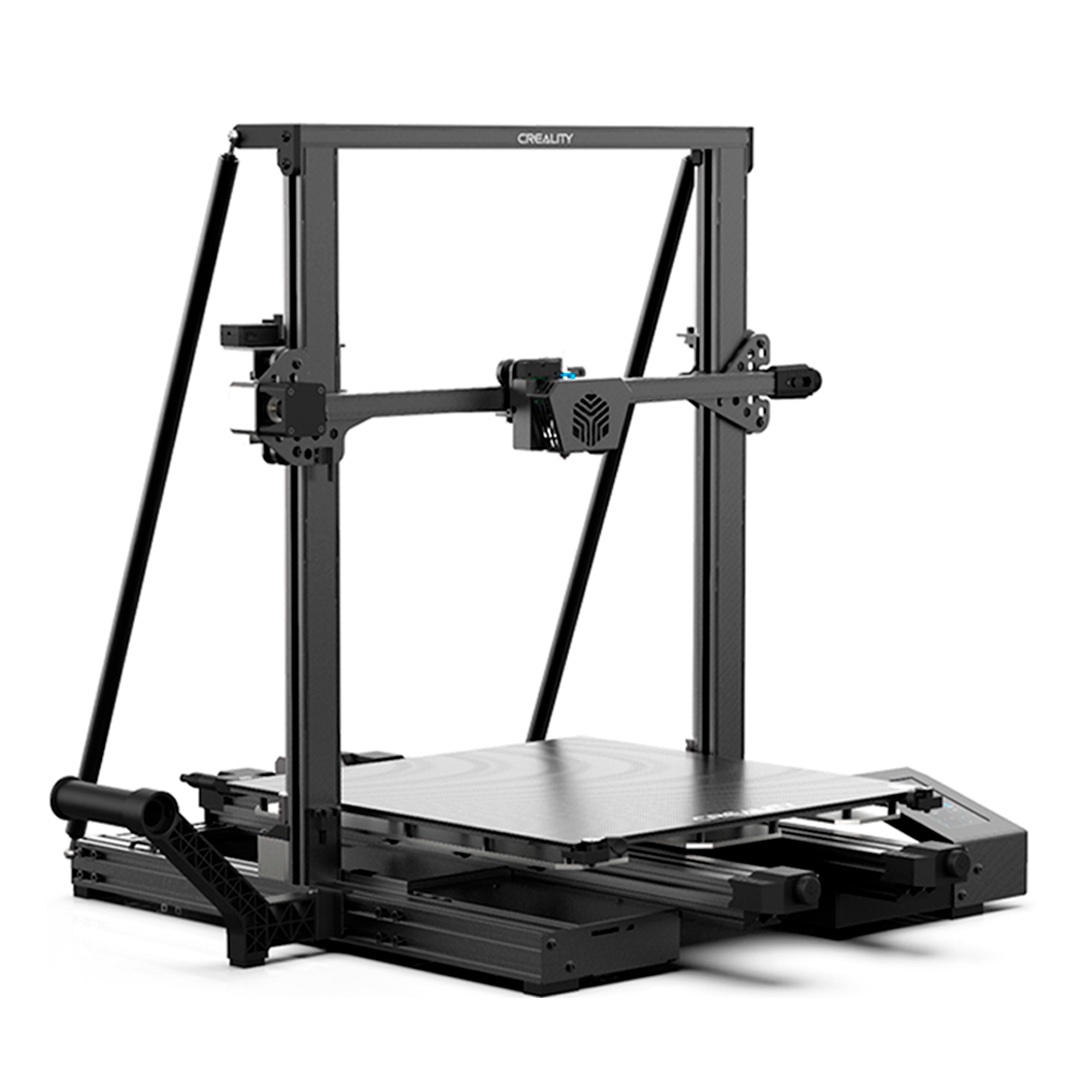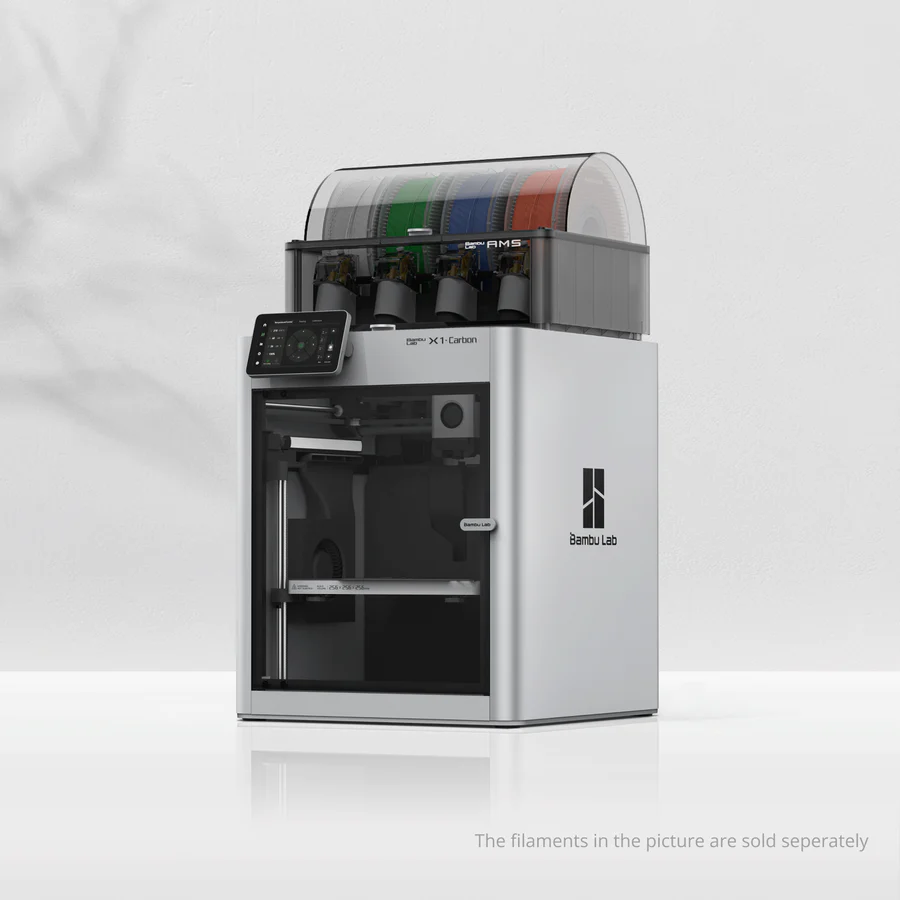Compare CR 6 Max vs X1 carbon
Comparison between the best 3D printers
Choose the best 3D printer at the best price. The cheapest 3D printers are here.
Buy a 3D printer here with 3D Fila.
 |
 |
|
| Model | CR 6 Max |
X1 carbon |
| Printing Material | Filament | Filament |
| Buy Filament for Creality 3D CR 6 Max | Buy Filament forBambu Lab X1 carbon | |
| Estimated price | $700,00 | $1449,00 |
| Manufacturer | Creality 3D | Bambu Lab |
| Release Year | 2021 | 2023 |
| Print Volume [mm] | 400x400x400 | 256x256x256 |
| Printer Size [mm] | 725x640x691 | 389x389x457 |
| Weight [kg] | 14 | 14,13 |
| Power Loss Recovery | YES | YES |
| Enclosed printer | NO | YES |
| Bed Leveling | Automatic | Automatic |
| Filament End Sensor | YES | YES |
| Bed type | Heated | Heated |
| Power supply system | Bowden | Direct Drive |
| Standard nozzle | 0,4 | 0,4 |
| Maximum Nozzle Temperature [°C] | 260 | 300 |
| Maximum Bed Temperature [°C] | 90 | 120 |
| Maximum printing speed [mm/s] | 100 | 500 |
| Filament holder | YES | YES |
| Camera for supervision | NO | NO |
| Recommended filaments | PLA, PETG | PLA, PETG, TPU, PVA, PA, PA-CF, Nylon, PC |
| Recommended slicers | Cura, Simplify, Slic3r, IdeaMaker | Bambu Studio, Super Slicer, Cura, Prusa Slicer, Orca |
| Maximum Resolution [mm] | 0,1 | 0,1 |
| Processor | Quad ARM A7 1.2 GHz | |
| Display | Display touchscreen 4,3'' | Touchscreen 5'' |
| Power Supply | 110/220V / 500W | 350 W |
| Connectivity | SD / USB | Wifi, Bambu bus, Cartão SD |
| Operating systems | Windows, Mac, Linux | Windows, Linux, Macbook |
| Date of registration in the system | 2022-11-04 | 2024-04-10 |
| Release date | 2021 | 2023 |
| Extra features | Crealitys CR-6 Max printer offers a large 400 x 400 x 400mm build area, perfect for larger projects without dividers. Its auto-leveling system and force sensor simplify setup. It has a 4.3-inch touchscreen and convenient features like a tool drawer and filament holder. Plus, its modular hotend, redesigned extruder, and silicon carbide-coated build plate improve print quality. | The Bambu Lab X1 Carbon revolutionizes 3D printing with stunning design, high print speeds, and a streamlined user experience. It stands out with its CoreXY system, a hotend capable of reaching 300°C, allowing for a wide range of filaments. Its LiDAR-assisted bed leveling system, vibration compensation, and AMS multicolor printing capability raise the industry standard. Print quality is impressive, with the ability to fine-tune for perfection. The X1 Carbon, with its closed build volume, not only promises but also delivers one of the most advanced 3D printing experiences available to consumers. |
| Support for multiple colors and materials (AMS and CFS) | NO | YES |
Notes * |
||
| Cost-benefit | 6 / 10 | 7 / 10 |
| Hardware | 2 / 10 | 5.6 / 10 |
| Tela | . | . |
| Print volume | 4 / 10 | 4 / 10 |
| Performance | 1 / 10 | 4 / 10 |
Conclusion |
| In comparing the Creality CR-6 Max and the Bambu Lab X1 Carbon, both 3D printers offer distinct advantages suited to different user preferences and project requirements. The CR-6 Max, with its spacious 400x400x400 mm print volume, stands out for those who prioritize larger build capacity and affordability. It features automatic bed leveling, a heated bed, and a straightforward user interface, making it accessible and user-friendly for beginners and hobbyists. However, it lacks some advanced features that would appeal to professionals, such as high-speed printing and extensive material compatibility. On the other hand, the X1 Carbon is a cutting-edge option that excels in speed, versatility, and advanced printing technology. Its CoreXY system and maximum printing speed significantly surpass those of the CR-6 Max, allowing users to produce high-quality prints in less time. The ability to handle a wider variety of materials, supported by features like LiDAR-assisted bed leveling and multi-color printing capabilities, positions the X1 Carbon as an impressive tool for professional use and more complex projects, albeit at a higher price point. In summary, the decision between these two printers should be based on the intended use and budget. The CR-6 Max is a cost-effective choice ideal for larger prints and beginners, while the Bambu Lab X1 Carbon offers advanced functionality for serious enthusiasts or professionals willing to invest more for superior speed and material versatility. |

